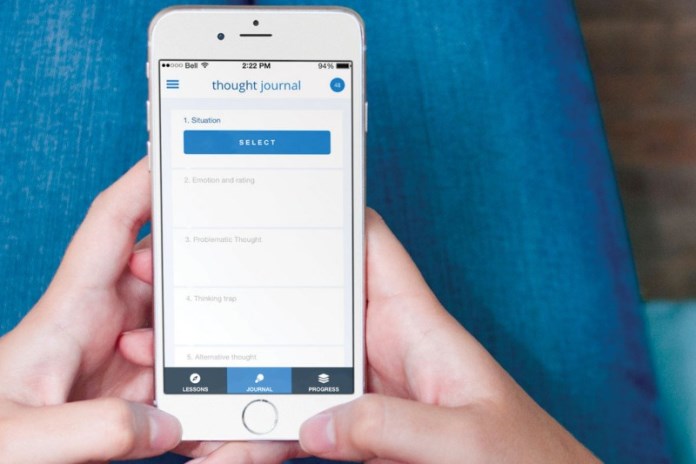Mobile cognitive therapies gain traction as first-line mental health intervention
 Mental health apps let you access therapy from your smartphone (New Scientist):
Mental health apps let you access therapy from your smartphone (New Scientist):
“Lie down anywhere that suits: the world is now your therapist’s couch. A wide range of apps now deliver mental-health care straight to your smartphone.
With PTSD Coach, users can discreetly screen themselves and learn more about the disorder. Moodnotes keeps track of emotional swings and offers new perspectives on a situation. And on Talkspace, for a weekly fee, users can anonymously text a therapist any time and receive a response within the next few hours.
Next week, another app in this vein debuts: TruReach Health, offering free lessons in cognitive behavioural therapy, a treatment that teaches people to recognise and alter negative patterns in their thoughts or behaviours.
“I love psychologists. If everyone could go and see one, then we’d all be better off, but that’s just not possible,” says Perron. “We’re giving someone a tool because, 99 times out of 100, they just don’t have access to face-to-face therapy.”
Computer-based therapy may not be as outlandish as it may sound. In the UK, the National Institute for Health and Care Excellence recommends certain cognitive behavioural therapy programs for people with mild to moderate depression or panic and phobia.”
–> To learn more about the technology appraisal by the National Institute for Health and Care Excellence: Computerised cognitive behaviour therapy for depression and anxiety: Review of Technology Appraisal 51. From the technology section (a bit outdated, but still a great reference):
- 3.1 CCBT is a generic term that is used to refer to a number of methods of delivering CBT via an interactive computer interface. It can be delivered on a personal computer, over the Internet or via the telephone using interactive voice response (IVR) systems. As with CBT, pre-therapy assessment is recommended to ensure that people are suitable for therapy, and individuals require ongoing monitoring and support. It is suggested that a wide range of health or social care personnel could be used to facilitate the sessions. Several CCBT packages are currently available. Each has been developed for a specific target group or groups and uses different CBT algorithms. The personnel required to implement CCBT can vary from psychiatrist to practice nurse and the length of therapist’s time will also vary depending on the programme.
- 3.2 Beating the Blues (Ultrasis plc) is a CBT-based package for people with anxiety and/or depression. It consists of a 15-minute introductory video and eight 1‑hour interactive computer sessions. The sessions are usually at weekly intervals and are completed in the routine care setting (that is, GP practice). Homework projects are completed between sessions and weekly progress reports are delivered to the GP or other healthcare professional at the end of each session. These progress reports include anxiety and depression ratings and reported suicidality. No minimum reading age is specified.
- 3.3 COPE (ST Solutions Ltd) is a CBT-based system designed to help people with non-severe depression. COPE was developed as an IVR plus workbook-based system. It is also available as a network version (netCOPE). It assumes a minimum reading age of 11 years. People can phone as and when they wish. COPE is a 3‑month programme with five main treatment modules. Suicide assessment questions are included and people are urged to contact their doctor if suicidal ideation or plans are experienced.
- 3.4 Overcoming Depression: a Five Areas Approach (a Calipso product from Media Innovations Ltd) is a CD-ROM-based CBT system for people with depression. The system consists of six sessions of about 45–60 minutes each. The sessions are delivered in a mixture of text, cartoon illustrations, animation, interactive text, sound and video. It assumes a minimum reading age of 9–12 years for all but one module. The CD-ROM training materials suggest that a practitioner reviews the person’s use of the disc on three occasions over the course. Sessions are completed on a weekly basis.
- 3.5 FearFighter (ST Solutions Ltd) is a CBT-based package for phobic, panic and anxiety disorders. FearFighter was originally developed for a stand-alone personal computer (standaloneFF) but was later developed for use on the Internet (netFF). It is also available in a short version for educational purposes (FFeducation). FearFighter assumes a minimum reading age of 11 years. FearFighter is divided into nine steps. Therapist contact for FearFighter is brief, with 5 minutes before the session and up to 15 minutes after each session. For netFF, therapist contact is by telephone or e‑mail.
- 3.6 BTSteps (ST Solutions Ltd) (now called OCFighter) is designed to help people with OCD by helping them plan and carry out CBT on a day-to-day basis. BTSteps was developed as an IVR system plus workbook. It assumes a minimum reading age of 11 years. An Internet version is under development and will obviate the need for IVR and workbook. Helpline support is provided. BTSteps is divided into nine steps.
- 3.7 The availability of CCBT programmes permits increased treatment flexibility, especially for individuals who do not want, or who are not suitable for, drug therapy or who do not wish to interact with a therapist. Computerised delivery of CBT can also be used to support therapist sessions. CCBT may also be of benefit to individuals with, for example, agoraphobia and social phobias because it can be delivered at home. Minimal therapist appointment time is necessary for the types of CCBT that can be conducted at home, and the therapy has 24-hour availability for the individual to access at his or her convenience. CCBT systems can also make it possible for users to repeat sessions if they wish.
Learn more:


